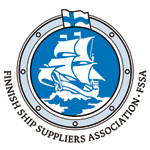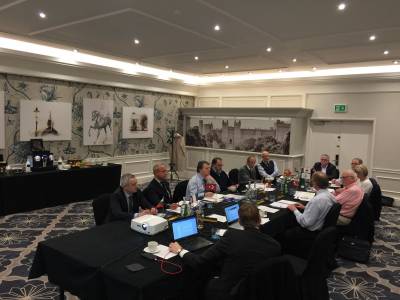Members
Suomen Laivakauppiaitten Yhdistys r.y.
|
|
|
|
|
|
Interview with Matti Kokkala (courtesy of The Ship Supplier ISSUE 28)
How did you get into ship supply and what contributions and skills do you bring to ISSA?
In 1919 my grandfather Albert Ottonen started a shipchandlery company in Uuras near Vyborg (which is in Russia today) but after the Second World War the family moved the business to Rauma on the west coast of Finland until it was sold in 1976. I started a year later as a salesman in Rauma and became branch manager in 1980. By 1994 I had joined ME Group Ltd’s perishable goods division as a director. I became managing director of the ME Group Ab (Sweden) in 2002.
I have been a board member of the Finnish Ship Suppliers Association since 1995 and president since 1996. Joining the ISSA board in 1996, I and was elected an ISSA Executive Vice President in 2002. I have been an OCEAN board member since 1995. What skills do I bring to ISSA? I am a realist and have a broad vision and understanding of the Scandinavian Ship Supply market. I started my ship supply career with cargo vessels but now run a businesses with a broad clientele (cargo vessels, passenger
ships, diplomatics, export etc).
How important is OCEAN it and how does it dovetail with ISSA?
Like all associations, it gives you just as much as you are prepared to put in. OCEAN is not all about meetings as there is a lot of background work going on as well. It is a vital component of the European Ship Suppliers industry when it comes to debating and advising on common elements such a Brussels. It makes life a lot easier when we can have an active input into the legislation. OCEAN enjoys extremely good relations with ISSA which has long supported it and will hopefully continue to do so in the future.
History of the Finnish Shipsuppliers Association (from THE SHIPSUPPLIER Edition 28)
Trying to forge an existence as a ship supplier just after the Second World War was not an easy one so when seven Finnish ship supply companies gathered together in Helsinki in 1946 to establish the Finnish Ship Suppliers Association they must have wondered how they would have coped. "In those days ship supply was a tough industry," said Matti Kokkala, chairman of the Finnish Ship Suppliers Association. "There was shortage of everything and the companies were mainly small
family businesses. To put it into context, it was difficult to travel to the capital for a few days for a meeting and to then be ready to sit to the same table with your fiercest competitor for the first time must have taken a lot of courage and foresight," he added. But the deed was done and these forward-looking gentlemen managed to establish the association that operates so successfully today. But what was the reason behind the move: what prompted them to take this momentous step?
Well according to Matti, there were three main reasons:
• better possibilities to purchase fresh meat for ships provision
• possibility to invoice transportation costs from the vessels
• contact point when working with the authorities
Now 60 years on (2006), while the strategy plans may have altered somewhat and the membership changed, the association is still operating on behalf of its members. As Matti pointed out: "We still worry about those three very important factors our forefathers pointed out." The Ship Supply business is very different today that it was all those years ago. We now talk about logistics and just-in-time and specialised warehousing; everything must be as effective as it can be to be able to survive. Ships are modern, there is only a limited crew onboard and with ship turnround times crucial, harbour times for only a couple of hours. Inquiries and orders come and go via satellites, everything must be just as the customer ordered. But we wouldn´t have it any other way. One of the bedrocks of out members´ business is the passenger traffic to our neighbouring countries. Last year 9.7 million passengers travelled between Finland and Sweden and 6.1 million to Estonia. Another important vessel sector are the traditional cargo ships that regularly visit Finnish ports: as many as 40,209 ships visited our ports last year. During the last few years we have also had a lot of transit deliveries to Russian destination, especially new cars.
When talking about Finland, you have to remember that we are almost an island, with all cargo coming and going by sea. The FSSA has been active in a number of important areas over the years. Besides the fact that we have built up close contacts with the local authorities and other interest groups we are active members of ISSA and OCEAN, attending their meetings on a regular bases.














 The Finnish member of OCEAN is the Suomen Laivakauppiaitten Yhdistys r.y., the Finnish Shipsuppliers Association.
The Finnish member of OCEAN is the Suomen Laivakauppiaitten Yhdistys r.y., the Finnish Shipsuppliers Association.



